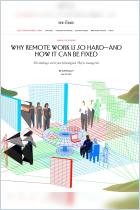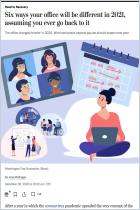
Recommendation
In late May 2022, Apple rescinded its three-day-a-week back-to-work schedule, supposedly because COVID-19 cases were rising again. The real reason wasn’t about public health, as Kim Velsey reports in New York Magazine. The company made the shift because its employees didn’t want to return to the office. Many other companies’ return-to-work plans also did not come to fruition, mostly because their employees had grown accustomed to more flexible schedules and learned they could work effectively from home. A standard “hybrid” model in which employees decide which days they will come to the office has proven difficult to carry out and its long-term viability is by no means clear.
Summary
About the Author
Kim Velsey is a staff reporter for New York Magazine.



















Comment on this summary or Démarrer une discussion